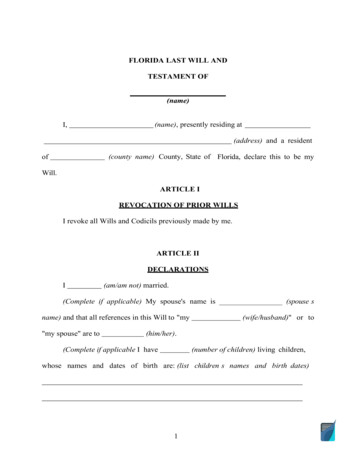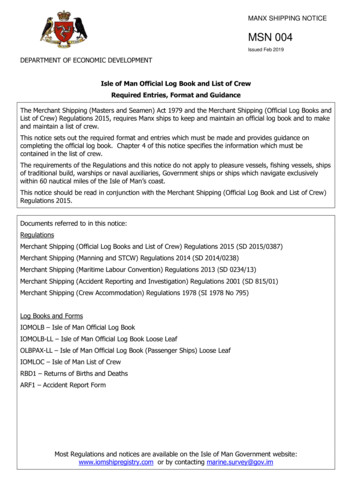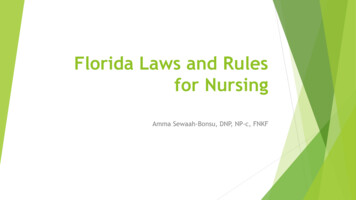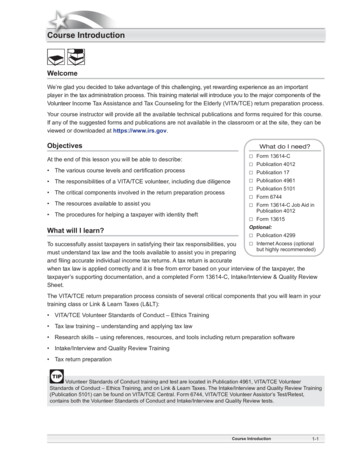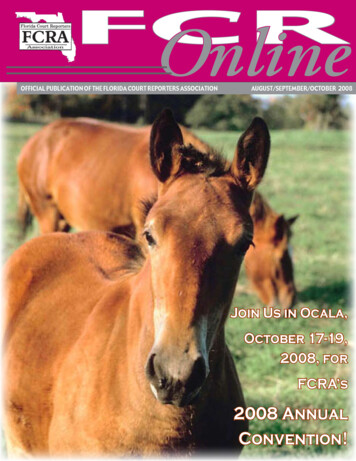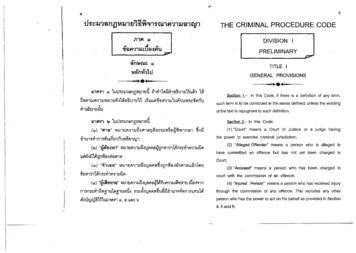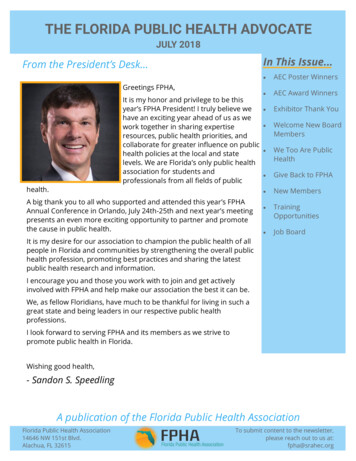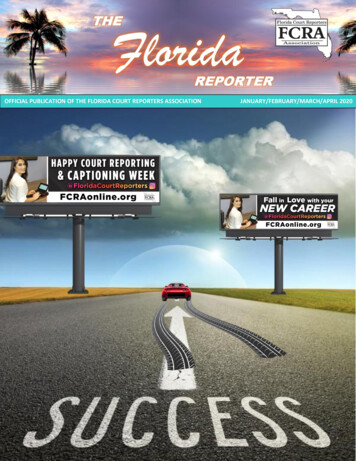
Transcription
OFFICIAL PUBLICATION OF THE FLORIDA COURT REPORTERS ASSOCIATIONJanuary/February/March/April The Florida ReporterJANUARY/FEBRUARY/MARCH/APRIL 20201
Advertising Special Contact to advertise in 8 issues(2 years) of this magazine andget a special 15% discount ontop of our low rates! Call FCRAHeadquarters today at407-774-7880.FCRA is nowon Instagram!Please follow us!Needful PeopleNeed a job? Need a reporter,agency owners? ContactPlacement Chairman SandiNargiz at 850-878-2221 or Fax:850-878-2254 orsnargiz@comcast.netFCRA IS NOW ONTWITTER!Search for the Twitter handlebelow and follow us!@floridacourtreporters@FCRA OfficialOrder Your Florida ManualMARK YOUR CALENDAR!Stay up to date on Florida Rulesand Procedures. Call 407-7747880 to order your electronicversion of the Florida Manual orvisit www.fcraonline.org to order.Just 75.00 for members!Be on the Lookout forUpcoming FloridaProfessional Reporter(FPR) Test Dates!FCRA 2020 Annual ConventionOcean Reef ClubKey Largo, FloridaJuly 17-19, 2019WEBSITE SPONSORSWANTEDJanuary/February/March/April The Florida !Your stories to share with otherreporters.Submit an article and receive .15CEU points if published in TheFlorida Reporter. Email your storytoeditor@fcraonline.orgARE YOU ONFACEBOOK?If so, join the FCRA Group bylooking up Florida CourtReporters Association all thelatest updates right at yourfingertips!Stenograph Special Get last-line pricing withStenograph supplies, as amember of FCRA receivesa rebate.ARE YOU CHANGINGYOUR CONTACT INFO ANDDON’T WANT TO MISSE-FLASHES?Be sure everything is current.Call FCRA Headquarters andgive them your updated infotoday (407-774-7880) or emailyour changes tocmike@kmgnet.com2
vvvvvvvvvvvvvvvvvvvvvvvvvFCRA OFFICERS & DIRECTORSPresidentAmy Marie Yarbrough, FPRmadamcourtreporterjax@comcast.netPresident ElectRichard Scire, RPR, FPRrichardscirefcra@gmail.comVice PresidentTracy Finan, RPR, FPRreportertrace@gmail.comTreasurerLaura Landerman, RMR, CRR, FPRrmrcrr@aol.comSecretaryCathy Carpenter, FPRcathylcarpenter@gmail.comNorthern DirectorTiffany Treffeisen, RPR, FPRTref0109@gmail.comCentral DirectorMichael Scire, RPR, CMRS, FPRmichaelscirefcra@gmail.comSouthern DirectorJessica Donnelly, FPRcreporter@bellsouth.netDirectors at LargeShari Smargon, RDR, CRR, CRC, MA, FPRstenorpr@gmail.comDanielle Freeze, RPR, CRR, FPRdaniellefreeze@gmail.comImmediate Past PresidentSharon Velazco, RPR, CLR, FPRscribe3159@aol.comEditor and PublisherRichard Scire, RPRrichardscirefcra@gmail.comAssociate EditorMichael Scire, RPR, CMRSmichaelscirefcra@gmail.comExecutive DirectorLynn Hupp222 S. Westmonte Drive, Ste. 101Altamonte Springs, FL 32714lhupp@kmgnet.comW: 407-774-7880 FAX: 407-774-6440DEPARTMENTSBulletin Board. 2President’s Message: Our Leaps and Bounds . . 4Editor’s Message: Our Foresight of 2020 . 5ASSOCIATION BUSINESSOur Times Ahead. . 6In an Age of High-Definition Digital Audio, Why Human Stenographers?. . 7We Are STENO. This is Why We are Still Here . 13Member Spotlight: A Conversation with Leah Willersdorf . 17To Be Mistaken for the Court Reporter 19Court Reporting & Captioning Week Photo Gallery . 21Twinspiration: The Mock Trial Competitions . 22One on One with Eve Barrett of Expedite . 23FCRA Takes on Florida School Counselor Association . 27The Diamond Vault: The Fourth Decade, Part II . 28Stenographers’ Free Publicity with MSNBC .37FCRA WELCOMESMembership Application . . 38Membership Pre-Authorized Payment Plan Form . 39Statements of fact, opinion, and all advertisementsare made on the responsibility of the author oradvertiser, alone, and do not imply an opinion orendorsement on the part of anyone connected withFCRA. Materials may not be reproduced withoutwritten permission. Address all correspondenceconcerning content of the magazine to the editor. Allcorrespondenceregardingmembershipandadvertising should be sent to FCRA Headquarters,222 S. Westmonte Dr, #111, Altamonte Springs, FL32714. Phone: 407-774-7880, Fax: arch/April The Florida Reporter3
By Amy Yarbrough, FPRFCRA PresidentOur Leaps & BoundsCourt Reporting & Captioning WeekAs we celebrated Court Reporting &Captioning Week 2020, we were reminded of our“becoming a stenographer” journeys.Myfavorite part of court reporting school waswatching the transformation of my peers. Ashigh-speed students transitioned to internships,they arrived to class polished inblazers, beaming about their day.Exposure to courtrooms and high-riseviews inspired that final push beyond225, and we were thrilled for theirbright futures and endless possibilities.Becoming a stenographerbrought me to the classroom setting,teaching me to advocate for thedeaf and hard-of-hearing consumerswho rely on accurate captions.Becoming a stenographer landed me a front-rowseat to courtroom proceedings and casesranging from railroads to natural disasters tocelebrities.In researching steno keyboards to includeon our annual Court Reporting & CaptioningWeek poster, I discovered all sorts of fun facts inaddition to the international keyboards. In somecountries, trials for witchcraft still take place. Insome countries, depositions are not permitted.We should be grateful for our sophisticated justicesystem as we celebrate our career serving thejudiciary.The Florida Court Reporters Association hasplayed a pivotal role in my professionaldevelopment. FCRA has become a secondfamily, welcoming from the moment I arrived atmy very first convention. We encourage andelevate one another in our passion for thisprofession.FCRA has provided continuingeducation that allows me to be more efficientand a whole army of mentors to call on whensearching for policy or procedure. Every year wecome together for conventions that excite, andthis summer’s trip to Key Largo will beone for the record books.In 2020 we celebrated CourtReporting & Captioning Week in anextra special way. Billboards in Tampa,Orlando, and Miami highlighted ourspecial week and celebrated a careerthat takes you places you could havenever dreamed. I encourage you toshare with us stories of the coolestplaces your machines have taken you.My most noteworthy CART assignment was beingonsite when President Obama came to UNF;second most memorable, projecting captions foran event at a TV station and later beingintroduced to my favorite NPR radio host.Becoming a stenographer developscharacter, resilience, drive, determination. I lookforward to continue celebrating with all of youthe magic of steno and a career that serves acrucial role in so many facets of our modernsociety.January/February/March/April The Florida Reporter4
By Richard S. Sciré, RPR, FPRFCRA President-Elect, EditorOur Foresight of 20202020 represents something before it evenproves itself. We refer to 20/20 for clear vision. Thenwe refer to it by the proverb “Hindsight is 20/20.” Butwhy do we only use it in a sentence after the fact?Now that the year 2020 is here, what if we looked uponit first rather than in retrospect? Speaker and authorSteve Maraboli said, “A lack of clarity could put thebrakes on any journey to success.” If we believe that,which I do, then we should wonder how we measuresuccess. As most, if not all, of us on the FCRA board,we strive to make a difference for all reporters andcaptioners and especially the members. We neverlose sight that we are entrusted with an enormousresponsibility. Maybe that’s where our “clarity” comesfrom. We don’t always agree but we always fight forwhat we believe is the greater good, even when weknow in our foresight that our hindsight will still be 20/20.How do we keep going after all that? It’s called“teamwork.”In this issue we delve into the currentsurroundings of what we see in front of us. Wecontinue to struggle with a court reporter shortageand low school enrollment, but we also celebrate ourfoundational successes to change that. This yearFCRA put up billboards promoting stenography duringCourt Reporting & Captioning Week. Court reporterseverywhere were blindsided by newsman BrianWilliams’ stupid comments about how outdatedstenographers are, or so that idiot thinks. I do not makeit a habit of telling people off. In fact, I always try tobe kind. In Mr. Williams’ sake, I’ve made an exception.Why? Because I’m not just fighting for my career butfor the profession as a whole. We are as viable as ever,and thanks to him, even the silent ones in ourprofession have found their voice.In this issue we have articles written by myfriends, Stanley Sakai and Ana Fatima Costa, whowrote articles defending stenography. You will alsoget to see some of the huge impact FCRA has madein advocating, recruiting, and promoting stenography.At the last minute before publication, I contributedone more article about our shout out on The RachelMaddow Show. We have jumped leaps and boundsthis year! Just when we think we’ve done it all, we’veonly just begun.Our future into success though cannot comewithout learning from the past. Thus, I am happy tointroduce the next installment of “The Diamond Vault,”leading to FCRA’s 60th Anniversary. Why is it importantto learn from the past? So we can fuel our future ofcourse! If we learn from yesterday and plan fortomorrow, we can always have time to enjoy today.Happy reading!Classroom and Career Day DemonstrationsAround the State!Did you know class demonstrations can get you 100 off on your annual FCRA membership? Rulesand restrictions apply. Contact headquarters to findout how to get YOUR discount by promotingstenography.January/February/March/April The Florida ReporterThe Florida ReporterDeadline Dates(WINTER) DEC/JAN/FEB/MARArticle Submission – November 5Online Publication – December 12(SPRING) APR/MAY/JUNE/JULYArticle Submission – March 5Online Publication – April 12(FALL) AUG/SEPT/OCT/NOVEMBERArticle Submission – July 5Online Publication – August 125
By Amy Yarbrough, FPRFCRA PresidentOur Times AheadConvention 2020Mark your calendar! FCRA will beholding its annual convention at the beautifulOcean Reef Club in Key Largo July 16 through19, 2020. Situated just 45 minutes south ofMiami, this exquisite property is the perfectlocation for convention re-imagined, a trulyunconventional convention. Plan for yoga atsunrise, kayaking through mangroves, and sandbetween your toes at sunset. Leaving themainland and entering the Florida Keys, you willfeel relaxed, refreshed, and recharged. Staytuned for more exciting details in the comingmonths for what promises to be anunforgettable experience.FPR Online Modules Coming SoonThe Ethics Committee is putting thefinishing touches on the online modules for theFPR, and the anticipated launch date is early2020. We are thrilled to soon offer the FPR fromthe convenience of home as well as at our nextconvention.NCRA in Orlando 2020Congratulations to Florida superstarsChristine Phipps and Cathy Phillips! Christine willbe installed as NCRA president and Cathy willbecome chair of NCRF at the NCRA 2020convention in Orlando next August. We lookforward to celebrating and thank you both foryour service. “If your actions inspire others todream more, learn more, do more, andJanuary/February/March/April The Florida Reporterbecome more, you are a leader” - John QuincyAdams.Finding BalanceMany aspects of our profession areunique;unexpectedexpedites,lengthyassignments, deadlines, difficult witnesses, newlocations each day, overwhelming amounts ofpages. It can be a roller coaster trying to keepup, and there’s just never enough time in a day.The Feminine Mystique, published in1963, introduced “the problem that has noname,” describing the longing women felt forfulfillment outside of the home. As womenentered the workforce, a new term arose, theso-called “second shift,” housework andchildcare most often performed by women. Asreporters, we have the added layer of a thirdshift, the pages we edit after long days ofwriting. The average person is spending overtwo hours per day on social media; that’s apart-time job!Nearly every hour of our day isaccounted for, and do we really ever feel“caught up”? As we move forward into 2020,may you find time for personal enjoyment.Unplug, go for a walk, catch the sunrise/sunset,create something beautiful, organize yourspace – whatever makes you happiest.Your FCRA board and committees arehard at work as we look forward to what liesahead. We look forward to seeing you andcontinuing to serve.6
By Stanley SakaiIn an Age of High-DefinitionDigital Audio, Why Do We Still UseHuman Stenographers?Ah, the dreaded questions stenographersand court reporters have had to endurehearing over and over again: “Why are we stillhiring stenographers when we could just berecording the proceedings and typing them uplater?” and “Isn’t your job going to be obsoletesoon?”For full disclosure, I am now a softwareengineer. But I’ve worked as a professionalfreelance stenographer for six years prior to mytransition. Although my main source of income nolonger comes from providing live-captioningservices, stenography is and always will be apassion of mine. It is such an intelligently andergonomically designed input system that,whether it be code or prose that I’m writing, itmakes my experience on the computer feel fluentand effortless—unhindered as compared tohaving to tap my thoughts out character bycharacter on a normal keyboard. As an engineer,I write code, write PRs, review others’ PRs, anddeploy to production all from my steno machine.Thanks to steno, I can send Slack communicationsat the speed of thought. I have shortcuts in thehundreds ranging from Docker and rake tasks togit commands programmed in so I can performpulls, pushes, stashes, pops, checkouts, andcountless other functions with one swift motion ofthe hand (TKRA*EUBG docker-compose run —rm app rake repo:db:init).I’m seldom without a steno machine if Ihave my computer on me. And, yes, I have moreJanuary/February/March/April The Florida ReporterContinued on next page7
Continued from previous pageIn an Age of High-DefinitionDigital Audio, Why Do We Still UseHuman Stenographers?than one of these keyboards. My portable one, asshown above, is a 3D-printed mod and it useslight-touch mechanical-keyboard switches—perfect for when I’m on the go or working fromPeople normally speak English at around a rate of160–220 words per minute. A skilled stenographeris able to hold a writing speed in excess of 200words per minute for hours. To become nationallycertified, one must pass a series of speed tests ona shorthand machine—the final of which requiresone to transcribe a two-voice Q&A dictation atan unrelenting rate of 225 words per minute at 95% accuracy for five full minutes in one take.The world record for steno speed is 360 words perminute for one minute, set by Mark Kislingbury. Ifyou’ve never seen one of these steno machinesbefore,meetAndromeda:“With a single chord, KPWRAERBGT(IMPRAERKT), I can import React fasterthan you can hit “I” on your keyboard.”one of our satellite offices.Ifyouaren’tfamiliarwithwhat stenography (or “steno” for short) is, it’s thesystem of chorded input performed on a specialkeyboard communicating with shorthand-to-textsoftware that court reporters and captioners useto quickly write down what is said in a courtroom,on TV, in lectures, or at Coachella. Basically, thisamounts to a single person being able to catchand write down what a roomful of people aresaying, verbatim, in real time. Olympic-level notetaking.You can thank Andromeda for this storyyou’re reading now. And, no, what you’relooking at is not a “cash register.”Continued on next pageJanuary/February/March/April The Florida Reporter8
Continued from previous pageIn an Age of High-DefinitionDigital Audio, Why Do We Still UseHuman Stenographers?As for how steno actually works, that’s forits own article entirely. What I’m here to discuss inthis piece is why this craft is still integral andrelevant to the legal and hearing-accessibilityrealms. It is currently under siege by numerousunscrupulous wielders of magic microphones whoprofess, “Digital recording is the future!” andfallaciously claim that simply replacing thestenographer with a microphone will cutcosts and produce comparable, if not bettertranscriptions than one taken stenographically byhand. After all, stenographers are humans, too:we make mistakes, we need breaks, we gethungry, and we tire like everyone else.Technology, including a microphone, does not.So much easier and cheaper; right?cheap price. Memory is also now extremelycheap. But go talk to any lawyer who’sconducted a deposition, and they’ll quickly tellyou that stenographers’ fees aren’t cheap andcan raise the cost of litigation by several figuresdepending on the length of the transcript andhow many copies are sold. Court reporterstypically charge a flat appearance fee and thenby the page, so if you have a 300-page transcriptand all parties are ordering copies, you might bein for sticker shock. So if we have this much-thriftieralternative, doesn’t it just make economic senseto let a recorder do the “work” and commission abargain-basement transcription service to type itup for you later?The problem with this proposition is twofold:First, people vastly underestimate howcommon background noise, mumbling, andpeople talking over one another are in normaldiscourse and how problematic these are foraudio recordings and speech-recognitionsoftware.Second, people who have not trained foryears to transcribe verbatim are actually reallybad at transcribing verbatim.“Hey, yo! Just throw one of these babies in, check!”Well, this seemingly obvious and viablealternative is problematic for several reasons.I mean, if you’re fortunate enough to have asmartphone, you have an audio recorder right inyour pocket. Go to Best Buy, and you can findrecorders with great audio quality for a fairlyJanuary/February/March/April The Florida ReporterContinued on next page9
Continued from previous pageIn an Age of High-DefinitionDigital Audio, Why Do We Still UseHuman Stenographers?Team of six normal typists on the left, oneprofessional stenographer on the right.Assuming you have normal hearing,human ears and their connection to the brain areexquisitely tuned for speech detection and canpick one voice out from the environment, whetherit be from a group of speakers or from downrightacoustic slurry. If you’ve ever held a conversationin a loud bar or a restaurant, you’ve experiencedthis uniquely human capacity in action.In the moment, you may not notice thatyou’re talking over one another and notenunciating clearly (because you have theinherent bias of knowing what you said). But to athird party, it may be that nothing that you oranyone uttered during that heated exchangewas comprehensible. A live stenographer presentwill immediately notice if he or she isn’t getting itand will tell the parties to repeat if a response wastoo quiet or quick to register. If everyone is talkingat once, the stenographer will be there toimmediately stop the proceeding and requestthat the parties slow down and go one at a timeso that everything said is properly noted andverified that it reads correctly on-screen.Microphones do not know when they are“not getting it,” and thus, cannot regulatepeople’s sloppy speech habits. Simply handing offa recording to someone who can hear and typeEnglish doesn’t necessarily guarantee they will beable to understand everything. They aren’t ableto see who is speaking, so it will be much harderfor them to correctly attribute each utterance toits speaker. Moreover, unless they are highlytrained, their verbatim-transcription skills may notbe up to snuff.Stenographers also perform painstakingresearch beforehand and will ensure they are inthe know of any tricky terms and acronyms thatmight come up in advance. Additionally, they willmeet each of the speakers, make sure they havethe correct spellings of all the names, and willidentify them in person during the deliberation.Once the proceeding begins, a live stenographerhas three distinct advantages over an audiorecording that are crucial to an accurate record: Being able to see who is speaking andmatch the identity of the speaker with theirwords. Having preloaded vocabulary and namesentered into their transcription software’slexicon. Above all, knowing the context in whichthese often industry-specific or esotericterms are being used at the moment theyare uttered.January/February/March/April The Florida ReporterContinued on next page10
Continued from previous pageIn an Age of High-DefinitionDigital Audio, Why Do We Still UseHuman Stenographers?A live person also has recourse to read aspeaker’s lips or their body language or to quicklyglance at documents or a PowerPoint foradditional cues during rapid-fire moments ofuncertainty.Also, based on years of feedback fromconference attendees who have complimentedthe quality of my and others’ live-captioning work,it has become clear to me that stenographers, ingeneral, can pick out words from mumbled stringsof syllables far better than the average personcan. This is because our ears are trained to catchevery word from years of practicing the art oflistening and simultaneously converting it toshorthand—whereas most people don’t realize itwhen they’ve missed some parts here and thereuntil they see it go up on the screen, and if not forthe live transcript, would just let it go.A remote transcriber who is not physicallypaper-shuffle can cover up an entire word orphrase in a recording. I’ve transcribed from pureaudio; even with steno, it’s an awful slog.Junk-ass audio leads to junk-ass transcripts.Live stenographers don’t merely transcribe, weact as verbal moderators to ensure every word iscaptured. Verbal moderation is a key part of thejob that people undervalue. It is both frustratingand infuriating when the Dunning-Krugererers outthere continually push for their seemingly simple“It is both frustrating and infuriatingwhen the Dunning-Krugererers outthere continually push for theirseemingly simple but inane solutions toa problem, the complexity of whichthey know nothing of.”present at the actual proceeding will lack all ofthis contextual knowledge, which often results inerrors, drops, misspellings, or “(inaudible)s” litteredin the final transcription. This is all in addition to thefact that the speed of a typist working with audiois comically slow (roughly one hour of transcriptiontime for every 15 minutes of audio) compared toa well-trained, real-time stenographer trailing onlya word or two behind at all times. One cough orJanuary/February/March/April The Florida ReporterContinued on next page11
Continued from previous pageIn an Age of High-DefinitionDigital Audio, Why Do We Still UseHuman Stenographers?but inane solutions to a problem, the complexityof which they know nothing of.So this is why relying on a dumb s, required by law that they be inwriting, that may dictate a person’s future is anABOMINABLE idea.People without experience transcribingdialogue verbatim from recording don’tunderstand how difficult, annoying, anddownright painful it is to have to constantly rewindover and over trying to parse words from a blob ofnoise because someone shifted in their seat,grazed their mic with their arm, or talked out ofturn. In the worst case scenario, those words arelost forever.People are messy in their communicationbecause, as humans, we’re lazy and want toexpend the least amount of effort to get themessage across. Unless you’re recording in asound-controlled booth with all parties having theenunciation skills of professional news anchors, alive human being will always have to be there toverbally moderate. Live stenographers ensure notonly that every utterance is accuratelydocumented, but also who said it, and when theysaid it. They are able to certify that the resultingtranscript is true and correct according to whatthey heard and witnessed. Microphones pairedwith remote transcriptionists simply can’tcompete with this level of fidelity. And that is whylive stenographers still and will continue to exist.Let us protect your record.January/February/March/April The Florida ReporterHave you seen FCRA’s Poster forCourt Reporting & CaptioningWeek 2020?12
By Ana Fatima CostaWe Are STENOThis is Why We Are Still HereMSNBC: Last Friday, January 31, 2020, during alive broadcast of the Senate impeachment trial,your Chief News Anchor, Brian Williams, askedformer Senator Claire McCaskill why the “stenowoman in the white blazer” was allowed to roveon the Senate floor “in 2020, this electronicage.”Ms. McCaskill: "I don’t know why we’re still usingan old-fashioned stenographer in the Senate, butit looks like to me they’ve upgraded it to digital atthis point.”Mr. Williams: “Yeah. It looks like she’s carrying acash register.”Ms. McCaskill: "Yep."Then they ofessional.Really, Mr. Williams? You minimized the crucialrole of the courageous guardian of the recordwho works diligently in a challenging, stressful jobcapturing the spoken word in high-profileevents like the impeachment trial of the presidentof the United States and provides verbatim,accurate official transcripts to "steno woman"? Isthat the BEST you can do?Andyouequatedthetechnologicallyadvanced, specialized chorded keyboard whichis connected to a Computer-Aided Transcription(CAT) system to produce verbatim transcriptsfrom the stenographer's precise finger placementof myriad shorthand word combinations to a"cash register"? Seriously?In all the years you have been coveringCongressional hearings, have you ever takentime to SPEAK with one of the stenographers?Where do you THINK the official transcripts ofdeposition, court, and Congressional hearingsyou and your colleagues use on air come from?Ms. McCaskill: As a member of the bar of Missouri,and especially during your 12 years as a Senator,did you ever speak with any of the OfficialReporters of the United States Senate, (i.e.,stenographers)? Did you ever ask for a transcriptof proceedings? Certainly you have READ atranscript of proceedings?Your "upgraded to digital at this point" commentis archaic. Stenographers have been providinginstant transcription of the spoken word viacutting edge CAT technology known as"realtime" since the 1980s. Where do you THINKthe words written on the bottom of the screensimultaneously as you and Mr. Williams spokecame from?Answer: Broadcast captioners(i.e., stenographers).Every word she’s speaking is being captionedaccurately by an "old-fashioned" stenographer,sent through multiple IP connections to encodersand then delivered in real time to both the TV andonline stream of MSNBC’s broadcast.Mr. Williams' and Ms. McCaskill's above exchangeis the epitome of disrespect for a profession thatdates back to 3500 B.C., when Sumerians begancapturing the spoken word to preserve historicalevents. According to The Gallery of Shorthand:The first verbatim shorthand writing machineContinued on next pageJanuary/February/March/April The Florida Reporter13
Continued from previous pageWe Are STENOThis is Why We Are Still Herein America was the 1879 Stenograph, inventedby Miles Bartholomew.Since 1879, stenographic machines and theprofessionals who use them have evolved andremain the most technologically advancedmethod of capturing the spoken word andproducing a verbatim record.don't listen to every word. So it doesn’t matter ifthey hear the entire word or sentence, especiallyif there are interruptions (i.e., someone sneezes inthe middle of a comment or question). Peopleget a basic understanding of what was said, orassume they do.Stenographers (commonly known as courtreporters) with those funny-looking machineshave used stenographic shorthand for over 140years to write 200-300 words per minute, fasterthan most people speak. [6]On the other hand, highly skilled stenographersspend thousands of dollars and several years ofinstruction and education in addition tothousands of hours of hands-on machine trainingto LISTEN for every SYL-LA-BLE and write itVERBATIM. And they can READ IT BACK exactly asit was spoken.Mr. Williams' and Ms. McCaskill's above exchangedemonstrates ignorance of the high level of SKILLrequired to be a stenographer. Unfortunately,they are not alone.Attorneys are tasked with zealously advocatingfor their clients and want accurate transcripts.Justice and appeals hinge on the accuracy ofthe official record.The increased use of voice-activated technology(i.e., ASR and AI) has led the general public andsome legal professionals to believe thatstenographers are on the verge of extinction. Butsavvyjudges,litigators,andelectedofficials know that no audio machine, device, orapp can replace the highly skilled livestenographic court reporter, for a multitude ofreasons. The bottom line is as guardians of ity, impartiality, and accountability.Court reporters are legally and ethically bound toproduce verbatim transcripts. In many states,they must abide by multiple state and federalrules of procedure and conduct.@MSNBC: Please INFORM your staff aboutstenographers’ crucial role capturing a verbatimrecord of the spoken word in numerous diversevenues, including the chaotic Senate floor,keeping a sharp eye and ear for those whose turnit is to speak while tuning out background noise,people entering and leaving, coughing,sneezing, rustling papers, etc.Audio recording personnel don't get any of theintensive training that stenograp
snargiz@comcast.net ARE YOU ON FCRA is now on Instagram! If so, join the FCRA Group by Please follow us! looking up Florida Court @floridacourtreporters @FCRA_Official Advertising Special Contact to advertise in 8 issues (2 years) of this magazine and get a special 15% discount on top of our low rates! Call FCRA Headquarters today at 407 -774 7880.


